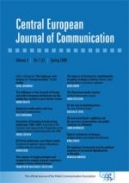The country of origin principle and competition among national regulatory régimes in East Central Europe
The country of origin principle and competition among national regulatory régimes in East Central Europe
Author(s): Gergely László Szőke, Gábor PolyákSubject(s): Politics / Political Sciences
Published by: Wydawnictwo Uniwersytetu Wrocławskiego
Keywords: EC media regulation; country of origin principle; Hungarian; Czech; Romanian media regulation
Summary/Abstract: The cornerstone of European media regulation is the principle of the “country of origin”, which makes it possible for broadcasters to establish themselves in any EEA Member State and to broadcast their programmes in another one (CEC, 2006). Th e less competitive is this regulatory framework when compared with other countries, the greater is the possibility that broadcasters will set up their operation in another state. Firstly, we shall describe the European legal framework relating to the country of origin principle, including the ECJ’s case law. We also propose to show the potential diffi culties of interpretation of the new regulation of the AMS Directive concerning this principle. We will also examine how the country of origin principle aff ects the media régimes of the East Central European region. We shall compare the Hungarian system with the regulations of Czech Republic and Romania, and we shall show those factors which influence the broadcaster’s willingness and motivation to choose a country from which to operate.
Journal: Central European Journal of Communication
- Issue Year: 2/2009
- Issue No: 02
- Page Range: 83-97
- Page Count: 15
- Language: English

